The late Robin Williams. It sounds like an oxymoron. How could anyone so energetically quick-witted ever be late? The same could be said for Joan Rivers who was so ahead of her time, she kept reinventing herself to keep up. This past year, we lost them both, certainly before we were ready to let them go, their deaths made all the worse because they were preventable. But that's what was so shocking; no one ever expected their timing to ever be off.
As the old year rolls out and awards season rolls in, "In memoriam" segments pay tribute to their careers with flashes of their faces among the famous fallen. But how 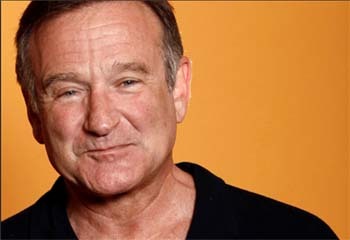 can that ever do justice to the people they were, or tell the tale of two trailblazers? The Emmys tried, accompanying their segment with the fitting song "Smile." ("Smile, though your heart is breaking...") Like its author, the iconic comedic genius Charlie Chaplin, Robin could do it all, whatever the screen, stage or genre. His stand-up was uproarious, but he was just as funny sitting down. While other talk show guests would promote performances, for Robin, the promotional appearance was the performance. (A compilation of his manic monologues would rival Michael Jackson's This Is It for posthumous popularity.) The way he'd get carried away, propelling himself out of his chair for spontaneous comic bits, swept us up with him.
can that ever do justice to the people they were, or tell the tale of two trailblazers? The Emmys tried, accompanying their segment with the fitting song "Smile." ("Smile, though your heart is breaking...") Like its author, the iconic comedic genius Charlie Chaplin, Robin could do it all, whatever the screen, stage or genre. His stand-up was uproarious, but he was just as funny sitting down. While other talk show guests would promote performances, for Robin, the promotional appearance was the performance. (A compilation of his manic monologues would rival Michael Jackson's This Is It for posthumous popularity.) The way he'd get carried away, propelling himself out of his chair for spontaneous comic bits, swept us up with him.
Joan also exercised her creative muscles in multiple media, as so many inventive souls do. She didn't just break the glass ceiling, she shattered it and then glued it back together. She rose from writing topical jokes for The Tonight Show to becoming its 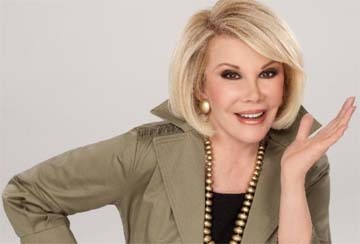 first female guest host, ultimately becoming the first woman to host her own late-night talk show (a feat still unaccountably rare). She directed a feature film, Rabbit Test, from her own screenplay, and in the male-dominated genre of insult comedy, she was the queen of cutting comebackers. She even designed a costume jewelry collection which featured a "statement necklace"; even her accessories spoke up. How tragically ironic that, in an effort to repair her vocal chords, the woman whose catchphrase was "Can we talk?" would suddenly be silenced.
first female guest host, ultimately becoming the first woman to host her own late-night talk show (a feat still unaccountably rare). She directed a feature film, Rabbit Test, from her own screenplay, and in the male-dominated genre of insult comedy, she was the queen of cutting comebackers. She even designed a costume jewelry collection which featured a "statement necklace"; even her accessories spoke up. How tragically ironic that, in an effort to repair her vocal chords, the woman whose catchphrase was "Can we talk?" would suddenly be silenced.
It's indicative of how accessible Joan and Robin 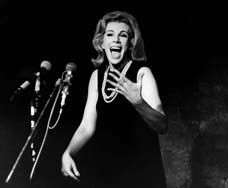 were to us, that we refer to them by their first names. You didn't have to meet them to feel like you knew them. In reality, they talked and we listened, but the way Joan applauded the audience as she entered a set, signaled the reciprocity. She often punctuated her caustic jibes with a well-placed "you don't know!" or an "oh, grow up!" making us part of the conversation.
were to us, that we refer to them by their first names. You didn't have to meet them to feel like you knew them. In reality, they talked and we listened, but the way Joan applauded the audience as she entered a set, signaled the reciprocity. She often punctuated her caustic jibes with a well-placed "you don't know!" or an "oh, grow up!" making us part of the conversation.
Robin reserved his incisive satires for politicians, dictators and egomaniacs, always exposing the absurdity of their ignorance while deconstructing their arrogance. His culturally savvy, brilliant routines spun everyday experiences into joyous life-lessons, but he also understood the effects of evil. When Steven Spielberg was filming Schindler's List on location in the death camps of Europe, he would phone Robin in San Francisco at night. "Just do five minutes for me," he'd plead, so that he could put the recreated horrors of the Holocaust from his mind long enough 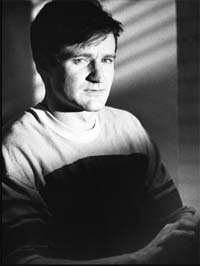 to get some sleep. Without missing a beat, Robin would unfurl a waterfall of soul-cleansing humor, enabling Spielberg to close his eyes before facing the next day's filming. But who was there to do five minutes for Robin?
to get some sleep. Without missing a beat, Robin would unfurl a waterfall of soul-cleansing humor, enabling Spielberg to close his eyes before facing the next day's filming. But who was there to do five minutes for Robin?
While Robin spoke candidly about his addictions to drugs and alcohol, he understandably never mentioned his war with depression. It's an ironic condition for a comedian. How can someone whose job is to bring joy, confess to such crushing sadness? Some wish he would have outed more of his medical demons. Like Rock Hudson and Michael J. Fox, he could have helped others, they reason, while raising awareness and funding for treatments. But who are we to say who should be the face of a disease, when it's not our face to wear?
Robin may not have even known which disease he was facing. Reportedly diagnosed with Parkinson's, an autopsy revealed he was suffering from Lewy body dementia, a related brain affliction with symptoms including progressive degeneration of cognitive 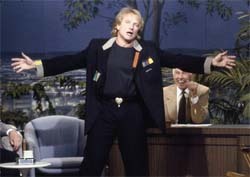 and physical functions. Its onset must have seemed insurmountable. (Perhaps a thrashing from Stephen J. Hawking would have given him hope.) Perhaps it's not our place to judge someone else's losing battle.
and physical functions. Its onset must have seemed insurmountable. (Perhaps a thrashing from Stephen J. Hawking would have given him hope.) Perhaps it's not our place to judge someone else's losing battle.
"Dying is easy, comedy is difficult." So goes the oft-quoted epitaph, attributed to the actor Edmund Gwenn, who played the Miracle on 34th Street's jolly Santa. But for Robin, the converse may have been true. Comedy, for him, was as easy as breathing. To lose the mental acuity that defined him may have been the more difficult death. If his thoughts were anything like his full-throttle improvisations, it's hard to imagine Robin finding solace in that storm of inner turmoil.
Joan's life was also touched by suicide. Her husband and manager, Edgar, killed himself, leaving her in financial debt 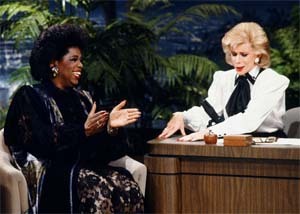 with a young daughter to raise on her own. It was then she contemplated canceling herself, like her pioneering program. (Her eponymous The Late Show: Starring Joan Rivers would have become a double-entendre.) Instead, she renewed herself to success, winning an Emmy for a daytime talk show, and bringing Melissa with her into the TV limelight. But Limelight, as Chaplin's movie of that title muses, can be a precarious place.
with a young daughter to raise on her own. It was then she contemplated canceling herself, like her pioneering program. (Her eponymous The Late Show: Starring Joan Rivers would have become a double-entendre.) Instead, she renewed herself to success, winning an Emmy for a daytime talk show, and bringing Melissa with her into the TV limelight. But Limelight, as Chaplin's movie of that title muses, can be a precarious place.
In the play Amadeus by Peter Shaffer, composer Antonio Salieri, moved by an opera's melding of many voices, singing in contrapuntal longing, notes: "What was evident was that Mozart was simply transcribing music completely finished in his head. And finished as most music is never finished. Displace one note and there would be diminishment. Displace one phrase and the structure would fall." Witnessing Robin's 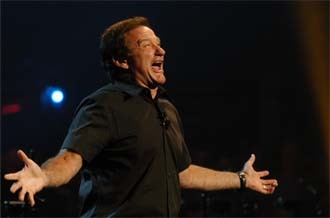 genius for comedic composition was like riding an operatic roller coaster; his synapses firing on all cylinders, voice rising and falling with a thousand inflections. Scintillating routines would emanate from his whole being in bursts of brilliance, just as Mozart gave birth to entire divertimenti in his head before committing a single note to paper. "It's hard to imagine unstoppable energy stopped," mourned Meryl Streep. But Joan wanted her funeral to be a celebration of show business life. "I want Meryl Streep crying in five accents," she wrote in one of her twelve books. It's enough to make us think of the ones unwritten. Robin's memoir would have been both insightful and outrageous, a riotous tome to fit his mantra of "pushing parameters" which for Joan was also a way of life.
genius for comedic composition was like riding an operatic roller coaster; his synapses firing on all cylinders, voice rising and falling with a thousand inflections. Scintillating routines would emanate from his whole being in bursts of brilliance, just as Mozart gave birth to entire divertimenti in his head before committing a single note to paper. "It's hard to imagine unstoppable energy stopped," mourned Meryl Streep. But Joan wanted her funeral to be a celebration of show business life. "I want Meryl Streep crying in five accents," she wrote in one of her twelve books. It's enough to make us think of the ones unwritten. Robin's memoir would have been both insightful and outrageous, a riotous tome to fit his mantra of "pushing parameters" which for Joan was also a way of life.
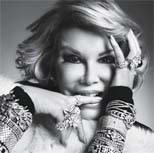 Like Joan, Carole Lombard, who also suffered a tragically untimely death, swore like a sailor. But as the golden goddess of 1930s screwball comedy, she knew her way around a verbal fence: "In a straight role, you react as you would in life. In a comedy, you have to do the unexpected." Both Joan and Robin did just that. Still, it's no surprise Robin would win an Oscar for Good Will Hunting. So much contained
Like Joan, Carole Lombard, who also suffered a tragically untimely death, swore like a sailor. But as the golden goddess of 1930s screwball comedy, she knew her way around a verbal fence: "In a straight role, you react as you would in life. In a comedy, you have to do the unexpected." Both Joan and Robin did just that. Still, it's no surprise Robin would win an Oscar for Good Will Hunting. So much contained 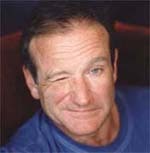 energy simmering beneath the surface made him a compelling presence in dramatic parts, the suppressed outburst adding poignancy or menace. (It almost felt like he should win something just for not bouncing off the walls.) Still, the lack of respect of modern Oscar voters for comedy is no joking matter, as they annually favor melodramas punctuated by faux blood and glycerin tears. But great comedic timing cannot be faked. While some actors can cry on demand, it's much harder to make people laugh on demand (see Preston Sturges's Sullivan's Travels), especially if you make them laugh so hard, they're crying.
energy simmering beneath the surface made him a compelling presence in dramatic parts, the suppressed outburst adding poignancy or menace. (It almost felt like he should win something just for not bouncing off the walls.) Still, the lack of respect of modern Oscar voters for comedy is no joking matter, as they annually favor melodramas punctuated by faux blood and glycerin tears. But great comedic timing cannot be faked. While some actors can cry on demand, it's much harder to make people laugh on demand (see Preston Sturges's Sullivan's Travels), especially if you make them laugh so hard, they're crying.
In recent years, Academy Award voters have taken to doling out Best Actress accolades to beautiful women who play ugly characters, giving them extra points for camouflaging their glamorous gene-pool-jackpot, 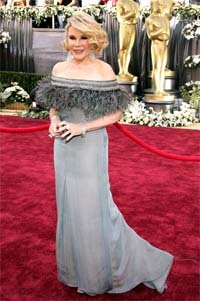 dermatologically enhanced looks with facial prosthetics and regrettable grooming. In life, Joan played that role in reverse. Though never ugly, she didn't think of herself as beautiful and wore her insecurities in her routines. "Don't dish it out, if you can't take it" never applied to Joan who disparaged herself to a cleverly brutal extreme. Funny in their time, her early potshots at her physique now seem uncomfortably misogynistic. ("Oh, boo-hoo!") But Joan evolved and, in a remarkable reversal, she perennially walked the red carpet with the "beautiful people" ("wink, wink") only to look down at them from her high-Fashion Police-perch. In the end, she'd turn her tongue-in-cheek critiques into a comedic coup d'état.
dermatologically enhanced looks with facial prosthetics and regrettable grooming. In life, Joan played that role in reverse. Though never ugly, she didn't think of herself as beautiful and wore her insecurities in her routines. "Don't dish it out, if you can't take it" never applied to Joan who disparaged herself to a cleverly brutal extreme. Funny in their time, her early potshots at her physique now seem uncomfortably misogynistic. ("Oh, boo-hoo!") But Joan evolved and, in a remarkable reversal, she perennially walked the red carpet with the "beautiful people" ("wink, wink") only to look down at them from her high-Fashion Police-perch. In the end, she'd turn her tongue-in-cheek critiques into a comedic coup d'état.
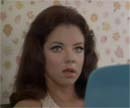 We should have seen it coming. The TV movie The Girl Most Likely To, which Joan co-wrote (with Agnus Gallin), is a prescient dark comedy in which
We should have seen it coming. The TV movie The Girl Most Likely To, which Joan co-wrote (with Agnus Gallin), is a prescient dark comedy in which 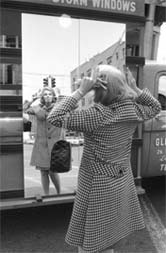 an ugly duckling (Stockard Channing) is transformed by plastic surgery into a looker, and takes revenge on all those who tormented her. The flick now plays like a self-fulfilling prophecy for Joan who never stopped mining her fine art of self-deprecation. For her profile's picture on the matchmaking website J-Date, she posted a photo of Nicole Kidman with a circle/slash through it. Using the "ideal date" slug to slam cheap suitors, she wrote: "The only way I'm going with you for a walk on the beach is if you own the beach." My own equivalent would be a meeting in front of a museum's Rembrandt self-portrait. That way I'm guaranteed to see at least one Renaissance man on that date. That a variation on Joan's joke springs to mind illustrates just how relatable her humor was.
an ugly duckling (Stockard Channing) is transformed by plastic surgery into a looker, and takes revenge on all those who tormented her. The flick now plays like a self-fulfilling prophecy for Joan who never stopped mining her fine art of self-deprecation. For her profile's picture on the matchmaking website J-Date, she posted a photo of Nicole Kidman with a circle/slash through it. Using the "ideal date" slug to slam cheap suitors, she wrote: "The only way I'm going with you for a walk on the beach is if you own the beach." My own equivalent would be a meeting in front of a museum's Rembrandt self-portrait. That way I'm guaranteed to see at least one Renaissance man on that date. That a variation on Joan's joke springs to mind illustrates just how relatable her humor was.
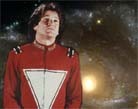 Unrealistic expectations in romance were a leitmotif in my article "A Tobor the 8th Man Valentine," recently nominated for a National Arts & Entertainment Journalism Award. (That honor came in the category of Best Profile, an award in itself, given the guy's a cartoon superhero robot - the hat-trick of fictional.) The awards, like so many others this season, were dedicated to Robin who shot to stardom as the alien Mork - a sort of Tobor on speed - in TV's Mork and Mindy. It was apt casting for
Unrealistic expectations in romance were a leitmotif in my article "A Tobor the 8th Man Valentine," recently nominated for a National Arts & Entertainment Journalism Award. (That honor came in the category of Best Profile, an award in itself, given the guy's a cartoon superhero robot - the hat-trick of fictional.) The awards, like so many others this season, were dedicated to Robin who shot to stardom as the alien Mork - a sort of Tobor on speed - in TV's Mork and Mindy. It was apt casting for 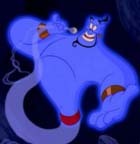 the antic actor who could amp himself up on a dime, then morph sweetly bashful with a blink. But no screen, large or small, could contain him. Like a genie in a bottle, he needed a bigger playground. One was finally uncorked for him in Aladdin, wherein his vocal gymnastics and
the antic actor who could amp himself up on a dime, then morph sweetly bashful with a blink. But no screen, large or small, could contain him. Like a genie in a bottle, he needed a bigger playground. One was finally uncorked for him in Aladdin, wherein his vocal gymnastics and 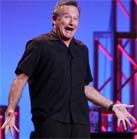 imaginings were released in a burst of cinematic stream-of-comedy fireworks. For the most animated of comedians, Aladdin was the quintessential showcase, and the Genie was his ideal avatar.
imaginings were released in a burst of cinematic stream-of-comedy fireworks. For the most animated of comedians, Aladdin was the quintessential showcase, and the Genie was his ideal avatar.
In some ways, Joan's avatar was her cosmetic-surgically remade self. Like Madonna, she was constantly reincarnating herself with new looks and new shtick. She wasn't just a performer, she was performance art, a living sculpture of her latest persona. "At this age, I am my work," 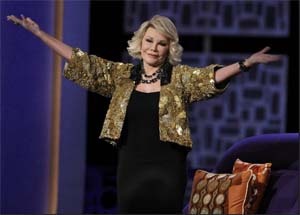 she famously said (referring to her jam-packed schedule) in the biographical documentary, Joan Rivers: A Piece of Work (an eponymous triple-entendre - Joan always upped the ante). Whether garbed in suits or plumes, she was naked in her candor. Encouraging people to fulfill their creative identities, she proclaimed, "If you don't do what you want today, you're a fool." And Joan was no fool. She spoke volumes by chairing the American Foundation for Suicide Prevention, but also empathetically supported the Elton John Aids Foundation and a food charity for infirm shut-ins. Robin's forays into philanthropy included co- hosting (along with Rabbit Test star Billy Crystal and Whoopi Goldberg) the phenomenally successful Comic Relief to benefit the homeless, while his repeated tours with the USO brought much needed comic relief to America's troops.
she famously said (referring to her jam-packed schedule) in the biographical documentary, Joan Rivers: A Piece of Work (an eponymous triple-entendre - Joan always upped the ante). Whether garbed in suits or plumes, she was naked in her candor. Encouraging people to fulfill their creative identities, she proclaimed, "If you don't do what you want today, you're a fool." And Joan was no fool. She spoke volumes by chairing the American Foundation for Suicide Prevention, but also empathetically supported the Elton John Aids Foundation and a food charity for infirm shut-ins. Robin's forays into philanthropy included co- hosting (along with Rabbit Test star Billy Crystal and Whoopi Goldberg) the phenomenally successful Comic Relief to benefit the homeless, while his repeated tours with the USO brought much needed comic relief to America's troops.
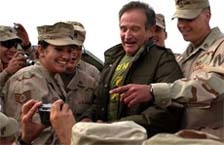 Both Robin and Joan knew that, in a world of terrorists, trauma, financial hardships and upheaval, humor is an indispensable tonic to our troubles. There is empirical evidence (both in astrophysics and the behavioral sciences) that laughter lives on long past the vibrations of its initial chuckle. It permeates our biorhythms, giving hearts something to beat to, and circulates from person to person. In laughter therapy, it's been observed that smiling sends electronic signals to the brain, stimulating endorphins, dopamine and even oxytocin ("the love hormone"), which relieves anxiety, boosts immunity, and lowers cortisol ("the stress hormone"), as befits "the best medicine." And it can be re-gifted. Happiness gurus encourage
Both Robin and Joan knew that, in a world of terrorists, trauma, financial hardships and upheaval, humor is an indispensable tonic to our troubles. There is empirical evidence (both in astrophysics and the behavioral sciences) that laughter lives on long past the vibrations of its initial chuckle. It permeates our biorhythms, giving hearts something to beat to, and circulates from person to person. In laughter therapy, it's been observed that smiling sends electronic signals to the brain, stimulating endorphins, dopamine and even oxytocin ("the love hormone"), which relieves anxiety, boosts immunity, and lowers cortisol ("the stress hormone"), as befits "the best medicine." And it can be re-gifted. Happiness gurus encourage 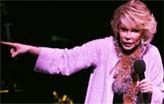
 gratitude exercises. Like Peter Pan's flying lesson, they exhort us to "think happy thoughts." Smile at three random people, they say, and since it's catching, the smiles will work their way back to you. To that end, laughter shares a gift with great sex; you feel instantly bonded to the giver, connected through your common humanity, becoming one with your fellow audience members howling in the aisles. Those that gift us laughter, lengthen and improve our lives, and in turn, we are grateful to them.
gratitude exercises. Like Peter Pan's flying lesson, they exhort us to "think happy thoughts." Smile at three random people, they say, and since it's catching, the smiles will work their way back to you. To that end, laughter shares a gift with great sex; you feel instantly bonded to the giver, connected through your common humanity, becoming one with your fellow audience members howling in the aisles. Those that gift us laughter, lengthen and improve our lives, and in turn, we are grateful to them.
The last movement of Beethoven's 9th Symphony begins with a recap of the major themes from the three movements that came before it, leading into his "Ode to Joy." Similarly, when we look back at those we've lost, we replay the major themes of their movements, bringing them together to see how each one informs the whole. Through the looking glass of their lives, we see our own, as we analyze their paths to joy, where they went wrong, which hurdles they jumped and how they survived, in an effort to stave off our own mortality. As we start the New Year with a smooch, we 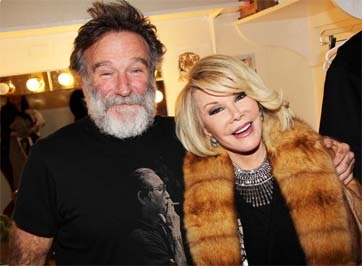 put our best lips forward to ring in what dreams may come. Robin and Joan lived their dreams and, in so doing, they fulfilled Robin's exultation (written by Tom Schulman) in Dead Poet's Society - they made their lives extraordinary. If laughter is the music of our lives, then scoring it is the comedian's calling. "When it works and it's right, it's amazing," reflected Robin, on mating the perfect joke to its ideal audience - his ultimate high.
put our best lips forward to ring in what dreams may come. Robin and Joan lived their dreams and, in so doing, they fulfilled Robin's exultation (written by Tom Schulman) in Dead Poet's Society - they made their lives extraordinary. If laughter is the music of our lives, then scoring it is the comedian's calling. "When it works and it's right, it's amazing," reflected Robin, on mating the perfect joke to its ideal audience - his ultimate high.
Both Robin and Joan had more gifts to give and we feel deprived by the loss of them. But we celebrate the souls they shared while they were with us. Their very productivity makes us realize, the more they did, the more they could have done that we'll miss, and the more we should do while we can. In the life-or-death arena of stand-up comedy, when one succeeds, they'll say "I killed out there." When they fail, they'll say "I died." But Joan and Robin never died, because the laughter they gave us lives on. They were that good. Now that the heavens get their best material, the twinkling stars are laughing themselves silly. And we can't help but look up and smile.
 For more comic relief, celebrate the screwball comedies of Preston Sturges, read a Tobor the 8th Man Valentine, or take a playful look at screenwriters looking for love. To start the New Year with a movie kiss, go here. For more on Michael Jackson and Madonna, go here. For love at first sight in the films of Charlie Chaplin and Sturges, go here. For more on the author, follow Devra on Twitter @devramaza and visit DevraMaza.com.
For more comic relief, celebrate the screwball comedies of Preston Sturges, read a Tobor the 8th Man Valentine, or take a playful look at screenwriters looking for love. To start the New Year with a movie kiss, go here. For more on Michael Jackson and Madonna, go here. For love at first sight in the films of Charlie Chaplin and Sturges, go here. For more on the author, follow Devra on Twitter @devramaza and visit DevraMaza.com.
Photo credits:Robin Williams portrait, Joan Rivers roast, Robin and troops, microphone, courtesy of AP; Joan stand-up, courtesy of Pix Inc.; Robin as Garp, courtesy of Warner Bros.; Robin with Johnny Carson, Joan with Oprah Winfrey, courtesy of NBC; Robin stand-up, courtesy of Reuters; Joan portrait, Stockard Channing as The Girl Most Likely To, Robin as Mork, courtesy of ABC; Joan red carpet, Joan mirror, Robin winks, Robin points, Joan points, Robin and Joan, Joan heart/flowers, courtesy of Getty Images; Joan jewels, courtesy of W; Aladdin's Genie, courtesy of Disney; Robin blue stand-up, courtesy of Startraks.
Spread the joy: What's the funniest joke you ever heard or the ![]() biggest laugh you ever had? Tell us in Conversations.
biggest laugh you ever had? Tell us in Conversations.
